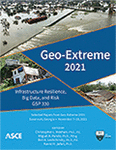Infrastructure and Community Resilience through the Lens of Civil Engineering Students
Publication: Geo-Extreme 2021
ABSTRACT
Community resilience, as a heterogeneous set of components, includes many interconnected systems that actively interact with each other. These sociotechnical networks in their default forms are not always aligned, and therefore the resultant move or change may not be as expected. One system that has a significant role in the community resilience’s comprehensiveness is the educational system, which provides a considerable input for workforce required to design, develop, execute, and maintain resilient infrastructure and communities. To explore to what extent civil engineering and construction programs provide their students with adequate training about infrastructure and community resilience, a study was conducted in 2019–2020. The study had two primary research questions. First, how do construction and civil engineering male and female students perceive different aspects of infrastructure and community resilience? Second, how can relevant academic programs increase the subject interest and knowledge of students and pave their paths to become community resilience professionals and managers? A quantitative research methodology was used to gather, model, and analyze data. After preliminary studies, a survey was designed and distributed to collect civil engineering students’ perceptions. A total of 382 students from 15 higher education institutions in the US participated in the survey. While the results indicated a gap in participants’ perceptions toward resilience definition, factors, scope, and tools, students showed undeveloped potentials that can be exploited by community resilience educators and administration.
Get full access to this article
View all available purchase options and get full access to this chapter.
REFERENCES
Ahmed, Y., Taha, M. H., Al-Neel, S., and Gaffar, A. M. (2018). Students’ perception of the learning environment and its relation to their study year and performance in Sudan. International Journal of Medical Education, 145–150. doi:10.5116/ijme.5af0.1fee.
ASCE. (2017). The 2017 Infrastructure Report Card. The American Society of Civil Engineers (ASCE).
Deslauriers, L., McCarty, L. S., Miller, K., Callaghan, K., and Kestin, G. (2019). Measuring actual learning versus feeling of learning in response to being actively engaged in the classroom. PNAS, 116(39), 19251–19257. doi:https://doi.org/10.1073/pnas.1821936116.
Economic Development Research Group. (2016). FAILURE TO ACT. American Society of Civil Engineers. Retrieved from https://www.infrastructurereportcard.org/wp-content/uploads/2016/10/ASCE-Failure-to-Act-2016-FINAL.pdf.
Ferreira, A., and Santoso, A. (2008). Do students’ perceptions matter? A study of the effect of students’ perceptions on academic performance. 48(2), 209–231. doi:https://doi.org/10.1111/j.1467-629X.2007.00239.x.
Hazari, A. (2014, January 20). Learning Curve: student perceptions have a huge impact on understanding. Retrieved from South China Morning Post: https://www.scmp.com/lifestyle/family-education/article/1407745/learning-curve-student-perceptions-have-huge-impact.
McBride, J., and Moss, J. (2020, September 1). The State of U.S. Infrastructure. Retrieved from Council on Foreign Relations: https://www.cfr.org/backgrounder/state-us-infrastructure.
NOAA National Centers for Environmental Information (NCEI). (2020). U.S. Billion-Dollar Weather and Climate Disasters. doi:10.25921/stkw-7w73.
Portnov-Neeman, Y., and Barak, M. (2013). Exploring Students’ Perceptions about Learning in School: An Activity Theory Based Study. Journal of Education and Learning, 2(3). doi:10.5539/jel.v2n3p9.
Sitzmann, T., Ely, K., Brown, K., and Bauer, K. (2010). Selfassessment of knowledge: A cognitive learning or affective measure? Academy of Management Learning & Education, 169–191.
Information & Authors
Information
Published In
Copyright
© 2021 American Society of Civil Engineers.
History
Published online: Nov 4, 2021
Authors
Metrics & Citations
Metrics
Citations
Download citation
If you have the appropriate software installed, you can download article citation data to the citation manager of your choice. Simply select your manager software from the list below and click Download.
